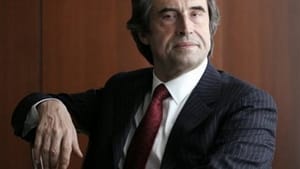What Beethoven knew (and Muti and Charles de Gaulle, too)
What makes a composer great?

“The best artists are those who read a lot,” Susan McAninley, my art director at the old weekly Welcomat, used to say. “Without a sense of context, an artist is just an illustrator.”
The same could be said for composers, of course. Musicologists have long known that certain combinations of notes move our emotions in certain ways — so it might seem logical that mathematicians or even computers should make the best composers. Long before Mozart or Beethoven or even Bach, the English playwright William Congreve observed that "Music has charms to soothe a savage breast." Today Muzak owes its commercial success to its ability to stimulate desired behavior by piping canned music into shopping malls, grocery stores, department stores, cruise ships, airports, business offices, elevators, even phone systems while you’re on hold. The emotions that win Academy Awards for acting, the late film composer Marvin Hamlisch once observed, come mostly from the background music rather than the actor’s histrionics.
(Why law enforcement types have failed to utilize the value of music — in extracting confessions, say by playing the sort of confessional music that always creeps into interrogation scenes in Law and Order or in pacifying potentially violent prison inmates — is beyond me.)
Philadelphia composer Kile Smith once explained in BSR why rock 'n' roll can take you just so far emotionally but no farther. (“Rock, for all its euphoria, lacks flight. It stomps, but it can't pivot. For all its bad-boy jaggering, it's innocent of great melody.”) (Click here.)
So what, exactly, did Beethoven and Mozart bring to the table that, say, the purveyors of Muzak didn’t? Why (as Clarence Faulcon wondered in BSR recently) did Chinese students at Tiananmen Square and Germans at the Berlin Wall in 1989 play and sing Beethoven’s "Ode to Joy" rather than, say, "We Are the World" or "I've Gotta Be Me"? Why do tyrants tremble when their subjects start singing "La Marseillaise" but merely shrug at the sound of "The Star-Spangled Banner" or "God Save the Queen"? Why did "The Battle Hymn of the Republic" succeed in motivating Civil War soldiers to fight and die for their country while "Dixie" failed? Why is it that, when you hear the chorus of the Hebrew slaves from Verdi’s Nabucco, you want to sing along?
Muti’s college major
The answer, Clarence Faulcon implied in his discussion of Beethoven’s Ninth, is that great composers are not merely composers — they’re also humanists who speak to some greater concern than the mere production of instrumental music. And that concern must be universal and uplifting, as opposed to propagandistic and parochial. (Wagner understood how to move people’s emotions, but mostly his music makes you want to invade Poland.)
It always intrigued me that Riccardo Muti, the Philadelphia Orchestra’s music director from 1980 to 1992, did not major in music as a college student; he majored in philosophy. Throughout his long and eminent conducting career, he described himself not as a conductor but as a “man of culture.” He embraced Giuseppe Verdi as his hero not merely for the sound of Verdi’s music but for the larger messages of love, freedom, and brotherhood that it conveyed. His mission, as he saw it, was to unify the music and the message. No computer could perform that role.
De Gaulle’s parade
By the same token, I would argue, one good test of public leaders is their appreciation for music and other arts. Ignacy Jan Paderewski’s career as a pianist and composer enhanced his subsequent career as a Polish diplomat and prime minister. Václav Havel’s success as a playwright inoculated him against the corrupting influences of power when he became president of Czechoslovakia.
And then there was Charles de Gaulle. On the day after the liberation of Paris in August 1944, De Gaulle led an impromptu parade of hundreds of thousands of Parisians through the city’s streets. The parade had been organized so hastily that no band or orchestra was available. But when he stepped to the microphone, De Gaulle instinctively grasped the appropriate gesture: He led the crowd in singing an a cappella rendition of "La Marseillaise." (Click here.)
When I watch that moment in film clips, I can’t help thinking: How many other politicians would have thought of that? How many would have dared to sing in public, with or without instrumental accompaniment?
My old art director Susan McAninley could have answered that question: In music as in politics, context is everything.
Sign up for our newsletter
All of the week's new articles, all in one place. Sign up for the free weekly BSR newsletters, and don't miss a conversation.

 Dan Rottenberg
Dan Rottenberg